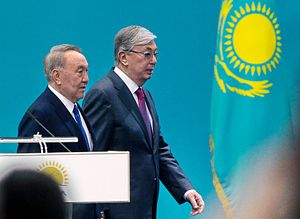It’s been a wild few months for Kazakh politics, starting with President Nursultan Nazarbayev’s resignation on March 19 and interim President Kassym-Jomart Tokayev’s decision a few weeks later to call for early presidential elections, now set for June 9. Since then, Kazakhstan has renamed its capital and seen a series of public protests, flashes of frustration with the political process and persisting socioeconomic inequalities.
To put the ongoing changes in context, The Diplomat spoke to Nargis Kassenova, currently a senior fellow in the Program on Central Asia at Harvard University’s Davis Center for Russian and Eurasian Studies. Kassenova is also an associate professor at KIMEP University in Almaty, Kazakhstan.
A burning question I’ve had is about the choreography of this transition: Why bother with the theatrics of resigning when Nazarbayev could have simply called for early presidential elections, as he has often in the past? What do you make of the timing and order of recent events?
I think you put your finger on the point: Theatrics is a very important aspect of our transition. President Nazarbayev clearly has a soft spot for spectacular politics, the pomp and circumstance. Calling for early presidential elections would be dramatic but not to the same extent as the “big bang” of resignation. It had to be a historic event on its own, mentally, emotionally, and temporarily separate from the upcoming elections. Scheduling it on the eve of the Nowruz celebration added to the symbolism. Why now? We don’t know and can only guess, but eventually we will find out.
As for the choreography of the transition, it seems likely that there is no clear plan. Nazarbayev and people around him have seen a lot during their careers and understand the fluidity of politics and the role that accidents can play in it. The goals are to preserve the status, security, and wealth of Nazarbayev and his family, and to maintain his legacy as a statesman and Leader of the Nation. The rest can be subject to modifications. The main intrigue for me is whether this plan aspires for an upgrade of Kazakhstan’s political and economic system, or it’s focused on keeping the status quo as long as possible. Both would be tall tasks under the circumstances.
On the one hand, the system has been rigid and risk adverse, with all the “screws tightened” for so long that the authorities seem to have lost the capacity of handling more complex systems. On the other, the maintenance of the system built around Nazarbayev would be impossible with him leaving the scene. Kazakhstan is a much more open and complex place for repeating the Turkmen scenario. [Editor’s Note: Turkmenistan’s first president died in office in 2006, followed by a smooth transition to a new, equally authoritarian, president chosen by elites, behind closed doors.] Elite power struggles are inevitable, and awakening of public politics is inevitable too. The thirst for change, even in the face of major uncertainty about the future, became clear on the day of the resignation. At present, both the elites and people are disoriented by the presidential duumvirate and the direction of change, but we definitely are moving into uncharted and tumultuous waters.

































